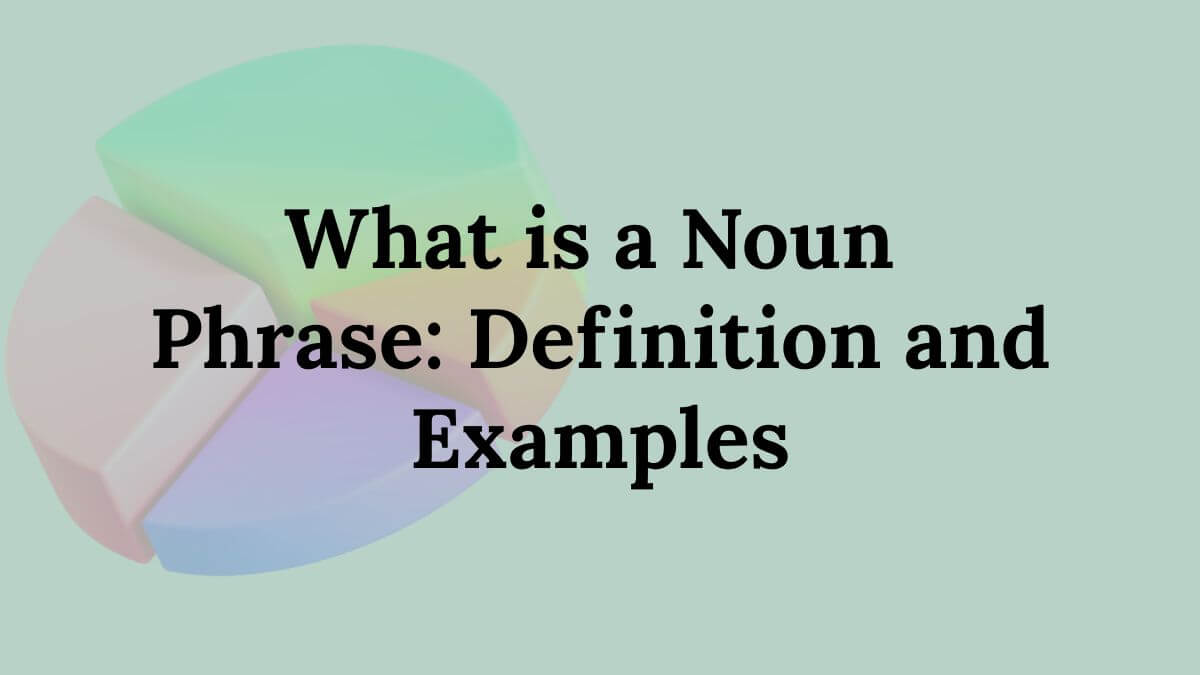Definition of a Noun Phrase
A noun phrase is a group of words that work together as a noun in a sentence. It includes a noun (or pronoun) and any words that modify it, such as adjectives, determiners, or prepositional phrases. In simple terms, a noun phrase is like a “noun team” – the main noun is the head, and the other words give more information about it.
To write better sentences, start by understanding what is a Noun Phrase. To write better sentences, start by understanding what is a Noun Phrase. If you’re wondering what a Noun Phrase is, it’s time to learn the basics. Grammar becomes clearer once you grasp what is a Noun Phrase. Discover what a Noun Phrase is and how it adds detail to your sentences.
What is a Noun Phrase? It’s a powerful way to expand your writing. To master English, first understand what is a Noun Phrase. What is a Noun Phrase – a question every grammar student should answer.
Examples:
- The big red balloon
➡️ “balloon” is the main noun, and the rest describe it. - My favorite book on the shelf
➡️ “Book” is the head noun, with modifiers before and after.
Structure of a Noun Phrase
A typical noun phrase structure is:
[Determiner] + [Adjective(s)] + [Noun] + [Modifiers]
Examples:
- The small cat
- A book on the table
- That bright star in the sky
- The hungry little puppy
- An exciting new project
- A strange noise in the hallway
Examples of Noun Phrases in Sentences
| Noun Phrase | Used in a Sentence |
| The old wooden chair | She sat on the old wooden chair. |
| A bunch of fresh flowers | He brought a bunch of fresh flowers for her. |
| My younger brother | My younger brother loves to play football. |
| The girl in the red dress | I saw the girl in the red dress at the party. |
| Some of his best friends | Some of his best friends moved to Canada. |
Why Are Noun Phrases Important?
Noun phrases are important because they are essential building blocks in English sentences. They serve several key functions that make our speech and writing clearer, more detailed, and grammatically correct. Here’s why they matter:
- They help expand your sentences.
- They make your writing more descriptive.
- They act as subjects, objects, or complements in a sentence.
How to Identify a Noun Phrase
A noun phrase always has a noun or pronoun as the main word (called the head of the phrase).
Example:
- The tall girl is running.
“Girl” is the noun, so this is a noun phrase.
Check for Modifiers Before or After the Noun
Modifiers can be articles, adjectives, determiners, possessives, prepositional phrases, or clauses.
Common modifiers:
- Articles: a, an, the
- Adjectives: beautiful, old, red
- Possessives: my, his, Sarah’s
- Quantifiers: some, many, all
- Prepositional Phrases: in the room, on the table
- Relative Clauses: who is sitting, that I met
Example:
- Some old books on the shelf are dusty.
The entire phrase “Some old books on the shelf” is a noun phrase. “Books” is the head noun.
To find a noun phrase in a sentence:
- Look for the noun (person, place, thing, or idea).
- Check the surrounding words that describe or modify that noun.
- If the group of words works together as a noun, it’s a noun phrase.
Example:
The tall man with a black hat walked in.
- Noun phrase: The tall man with a black hat
- Function: Subject of the sentence
More Noun Phrase Examples
1. As Subject:
- The clever little boy solved the puzzle.
2. As Object:
- She adopted a stray dog from the shelter.
3. As a Complement:
- His dream is a life full of adventure.
Examples vs. Just a Noun
| Noun | Noun Phrase |
| dog | a big, brown dog |
| girl | The girl with curly hair |
| house | That beautiful house on the hill |
| car | My father’s new red car |
Types of Modifiers in a Noun Phrase
Modifiers can include:
- Articles: a, an, the
- Adjectives: blue, happy, large
- Possessives: my, your, their
- Prepositional phrases: in the garden, on the table
- Participants: running water, broken window
Example:
“A beautifully painted vase from China stood on the shelf.”
Noun phrase: A beautifully painted vase from China
Noun Phrase Practice Exercise
Underline the noun phrase(s) in the following sentences:
- The big brown dog barked loudly.
- I saw a man with a scar on his face.
- That shiny red car belongs to my uncle.
- The sound of the rain was calming.
Conclusion
A noun phrase is a powerful grammatical tool that allows you to add richness and detail to your writing. Whether it’s a simple phrase like “the cat” or a more descriptive one like “the tiny black-and-white cat under the table”, noun phrases help you express more with just a few extra words. By mastering noun phrases, you can make your sentences more vivid, precise, and engaging.

